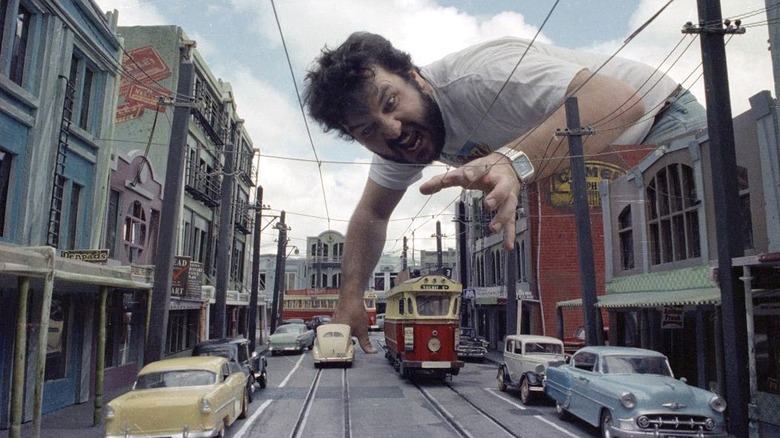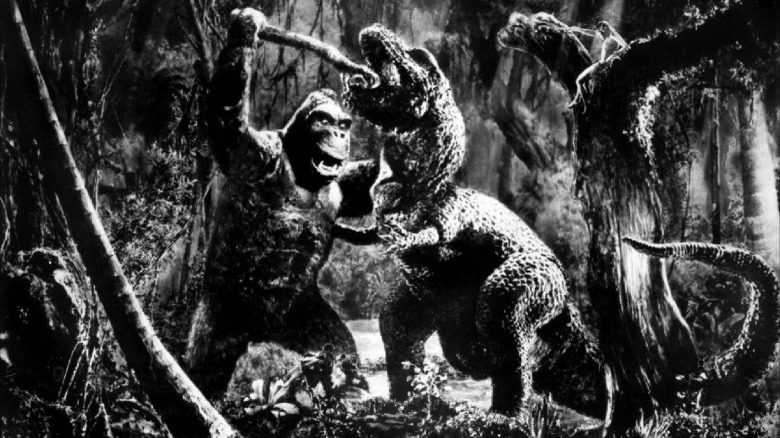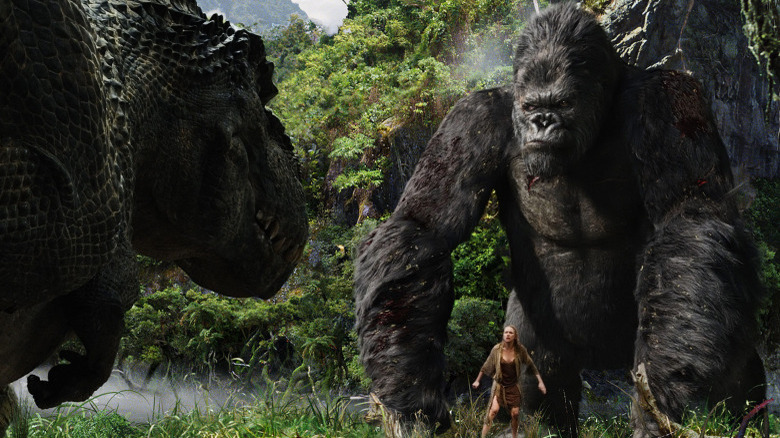
If you had told someone in the early 1990s that Peter Jackson would go on to direct one of the most beloved movie trilogies of all time, they probably would've given you a funny look, assuming they even knew who he was.
The New Zealand filmmaker got his start in the late 1980s and early '90s by pushing the boundaries of bad taste with the splatter horror-comedies "Bad Taste" (an apt title, to be sure) and "Dead Alive," the latter of which still ranks among the goriest movies ever made thanks to scenes where, among other things, the film's hero uses a lawnmower to take on a basement full of zombies. In between those movies, Jackson also made 1989's "Meet the Feebles," a twisted satire about Muppet-style puppets who take drugs, curse, have sex, and commit murder (it's "The Happytime Murders," only two decades before Brian Henson's infamous puppet crime-comedy).
Similar to Sam Raimi's early B-movies, Jackson's splatter comedies have gone on to gain cult status for their commitment to depravity. The filmmaker and his partner Fran Walsh would later enjoy their first taste of mainstream critical recognition with 1994's "Heavenly Creatures," a drama about the real-life 1950s Parker–Hulme murder that features Melanie Lynskey and Kate Winslet in their breakout roles. This, in turn, paved the way to Jackson and Walsh making 1996's "The Frighteners," a horror-comedy that acts as the bridge between their chaotic, low-budget comedies and their sprawling, effects-heavy epics to come -- even if it left critics like Roger Ebert grumbling it "looks more like a demo reel than a movie."
This, at last, brings us to Jackson's "Lord of the Rings" trilogy, which he directed from scripts that he co-wrote with Walsh and Philippa Boyens based on J.R.R. Tolkien's landmark fantasy tome. It was the movie trilogy's vast success across the board that gave Jackson carte blanche on his next film: "King Kong," a three-hour, $207 million remake of the classic 1933 monster adventure and the second such movie of its kind after the 1976 "King Kong" update. But for Jackson, this was more than just him taking another big swing after the staggering achievement of the "Rings" trilogy. This was the chance to fulfill a dream spawned by the very film that paved the way to him adapting Tolkien in the first place.
King Kong Made Jackson 'Want To Become A Filmmaker'

Directed by Merian C. Cooper and Ernest B. Schoedsack, 1933's "King Kong" was truly ground-breaking in the way it blended stop-motion effects with miniatures, matte paintings, and live-action footage to create the illusion of real-life human actors interacting with Kong and the other giant, fantastical denizens of Skull Island. For all the things that have aged poorly about the film (not least of which is the racist subtext and the imperialist portrayal of Skull Island's Kong-worshipping natives), there are shots in the movie as convincing to this day as anything computers can cook up. It's little wonder the picture captured a nine-year-old Peter Jackson's imagination the first time he saw it on TV.
"When I saw 'King Kong,' when I was nine years old, it did make me want to become a filmmaker," said Jackson, speaking to Three Monkeys Online prior to the release of his 2005 remake. He added:
"I've no idea whether I would still be making films if I hadn't seen 'King Kong.' But I remember that it was on TV on a Friday night here in New Zealand and the very next day after I saw 'King Kong' I started making little stop motion films with a Super 8 movie camera that my parents had used for home movies. I got some plasticine and I started to film some little movies, which then took me all the way through my teenage years. So it did get me going."
According to Ian Pryor's unauthorized 2004 Peter Jackson biography, Universal gave Jackson the offer to remake "King Kong" prior to seeing the final cut of "The Frighteners." The filmmaker passed at first before changing his mind, reasoning, "The fact it's my favorite movie is of some comfort to me, because at least I'm remaking something that's close to my heart." He even approached his "Heavenly Creatures" star Kate Winslet about appearing in the film, no doubt for the role of Ann. However, two other giant monster movie remakes in the forms of Roland Emmerich's "Godzilla" and Ron Underwood's "Mighty Joe Young" were already moving forward at other studios by that point, so Universal elected to put the project on hold for nearly a decade.
What Makes King Kong Great (To Jackson)?

Peter Jackson's love of the 1933 "King Kong" is evident in every frame of his 2005 remake, from the emotional depth it brings to the relationship between Ann Darrow (Naomi Watts) and Kong himself (Andy Serkis in another tour de force bit of motion-capture acting), to the sheer scale of the action and the relentless spectacle that ensues once the film's human leads arrive on Skull Island. It also begs the question if Jackson loves the 1933 "King Kong" a little too much, given the indulgent amount of time he spends developing side characters who still end up being glorified redshirts, and the way the movie draws out Kong's various brawls, to the degree that one begins to wonder: Are there really that many different ways to show King Kong punching a dinosaur?
On the other hand, the pure much-ness of it all seems to be the point for Jackson. As he sees it, "King Kong" is the epitome of what cinema is meant to do, where it concerns its ability to transport audiences to times and places far removed from their own realities:
"I think the original 'Kong' is a wonderful blend -- possibly the most perfect blend -- of escapism and adventure and mystery and romance. It does everything I think that good escapist cinema should do. It transports you and takes you places that you are never going to see and experiences that you are never going to have and it has that wonderful mixture of emotion and fantasy."
Looking back, it seems like "King Kong" was the start of a problematic trend in Jackson's career where every film he directed had to feel huge and transportive, even when it was antithetical to the story he was telling. But where his 2009 movie adaptation of "The Lovely Bones" was visually-spectacular but painfully misguided and his "Hobbit" film trilogy was shiny yet monotonous, "King Kong" is far more successful at justifying its hefty runtime. If any work deserves the Jackson epic treatment, it's the tragic tale of the Eighth Wonder of the World and the way man's hubris brings about his downfall. Just be sure to make yourself comfortable, should you decide to watch it in the near future.
Read this next: 20 Movies About Time Travel Ranked Worst To Best
The post How a TV Broadcast of King Kong Eventually Led to The Lord Of The Rings appeared first on /Film.
0 Commentaires